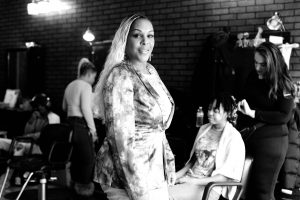People of ProsperUS: Ewanda Wyndella
Interview and Photography by Kenny Karpov
“My name is Ewanda Wyndella. I am 47-years-old and a single mom of five.
“I grew up on the West side of Detroit, with my mom and dad. My dad eventually moved to Chicago and became a politician. So I am kind of an activist with a cultural background. I was raised African centered. When I was young, I was one of those girls caught in the hood and the community that wanted to do good, and do better by my community. I believed in ‘each one, teach one’ and ‘each one, reach one’.
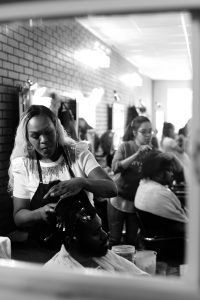 “Maybe around nine years old, I started doing braids and beads and selling lemonade in the community. I started gaining a hair clientele. So, by fourteen, I was working at a salon doing braids, and by 18, I decided to open up my own salon. And I’ve been running my own business for over 30 years. I’ve never really had a ‘real job’, always been one to work with my hands. Happy to be Nappy to me is more than a salon. It is a community center, an Afrocentric gift shop, and I have ten stylists working for me, and each of those ten have a backstory that isunique. Either they were people that were underprivileged, kinda had some negative things going on in their life, or had some setbacks. Some of the stylists here were homeless at one point or another in their life, and at one point they would come to my salon and clean and help out and eventually I trained them so they could have a job. I was always someone that wanted to beat the stereotypes, and so almost all the stylists here have been with me ten years plus. We’re more like a family salon, and I firmly believe because we’re on the Avenue of Fashion, whether you’re a grandmother, a cousin, an uncle, or a niece or nephew, you’re gonna see someone just like you when you come into Happy to be Nappy.
“Maybe around nine years old, I started doing braids and beads and selling lemonade in the community. I started gaining a hair clientele. So, by fourteen, I was working at a salon doing braids, and by 18, I decided to open up my own salon. And I’ve been running my own business for over 30 years. I’ve never really had a ‘real job’, always been one to work with my hands. Happy to be Nappy to me is more than a salon. It is a community center, an Afrocentric gift shop, and I have ten stylists working for me, and each of those ten have a backstory that isunique. Either they were people that were underprivileged, kinda had some negative things going on in their life, or had some setbacks. Some of the stylists here were homeless at one point or another in their life, and at one point they would come to my salon and clean and help out and eventually I trained them so they could have a job. I was always someone that wanted to beat the stereotypes, and so almost all the stylists here have been with me ten years plus. We’re more like a family salon, and I firmly believe because we’re on the Avenue of Fashion, whether you’re a grandmother, a cousin, an uncle, or a niece or nephew, you’re gonna see someone just like you when you come into Happy to be Nappy.
“So one of my models when I first started was positive social imagery — be a positive social image. I was definitely one of those young ladies that came from the drugs and streets and crime. All those negative things that come with growing up in Detroit, but I don’t use it as a stigma. I did have my children young, because I was an only child and I was like a lonely artist. So, I had my kids. And I was raised cultural, like Muslim, and African understanding. Family centered, as “we the people’, the village community. Even though I had my kids, I never let that set me back. As I did hair, I always reinvested in myself . I was really big on reinvesting in myself to show that positive social image. I didn’t take my money and run to Somerset to buy a Gucci bag and all that. I went to school. When I was younger and had my kids, I would take my money and enroll in film school.
“Because of doing hair, I started meeting celebrities and artists and they asked me to do their hair, and I would always ask them how they get where they were. Once they told me they did this class and that, I wanted to be like them. So, I would go to the same schools as they did, like for instance, David Talbert, he directed the films, ‘First Sunday’ and ‘Almost Christmas’. He is from Detroit, and almost fifteen years ago said to me he was going to be famous. He eventually became that, and he reached out back to me, so I started working with him in Hollywood. So, I started attending the film school he went to and meeting his teachers and started going to the BET and Grammys. I would take my money and go and be around the stars so I could have creative visualization.
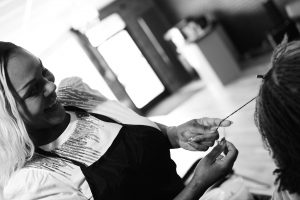
“So at one point when I opened up the store, it used to be a bookstore; we had the candles, incense, oils and books –self-help and self-motivation books. I had that for many years, but as my kids have gotten older, (and as everyone is doing great — my daughter has a full ride at Howard)[and]as I’ve gotten older, I sorta kicked back with the store part. But now that the store is pretty settled with the help of ProsperUS and Goldman Sachs, I have the ability, energy and the strength to bring that store front back. I feel that our community needs that. There is too much crime happening in Detroit, and when people come into Happy to be Nappy, you can feel that sense of self worth– whether you’re, white, black or Puerto Rican. My assistant is Brazilian. I am very big on being your natural self, natural hair, natural personality, your community; that is what I really pride myself on when you enter the World of Happy to be Nappy.
” To me the Avenue of Fashion was like a rose growing through cement.”
“Why the Avenue of Fashion? To me, because of the fact I’ve been right here, on this street for twenty years. I used to live around the corner on Sherwood Forest. One of my companies I developed as a young person was called Artpreneur — the business of art. I’ve always been a master artist, whether it’s being a painter, a singer, a dancer, all of that. So, I saw this shop for rent about twenty years ago, and the lady told me $650 – and I replied, I got it! I started a smaller version of Happy to be Nappy, which ended up blowing up and owning two stores that I combined into one as you see here today. At one point, this area, the Avenue of Fashion was very vacant, no one was here. It was like a ghost town. And I kinda feel having our store, and it’s environment, sorta paved the way, as we were always here […]. I remember a time when all the Detroit Lions and Pistons would come through — that started to create a wave on the Avenue of Fashion. With my store being African art — with all the oils and incense, you felt safe. So we started reopening up the lights and energy on the Avenue of Fashion, with all the mom and pops stores you see now. Like the Barber Shop next door, and things like that. To me the Avenue of Fashion was like a rose growing through cement. I saw the beauty in it from the beginning. I’ve always been a visionary — and I’ve been here from the beginning and I’ve never looked back.
“It feels safe on the Avenue of Fashion when I look at all the other communities I was raised in. […] It’s a very diverse neighborhood, like a mixing pot. I have clients in Palmer Woods, doctors and lawyers come into the shop and sit next to kids from Wyoming and Schaefer– all from the same environment. It’s like one big hub, like the colleg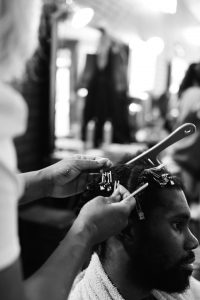 e over there, U of D Mercy, and we have the Bagley community. It’s a great hub and pub of communities. And community to me are the aunties and uncles, and we forget about that. ‘We the people’, we’re that community where your aunt said ‘don’t do that’. Now if something goes wrong, nobody wants to say anything. In my shop, they say don’t talk politics and religion and all that, but we’re gonna talk about it. In this shop you can come in and talk about anything. We have all types of backgrounds and races that come in here and talk amongst each other. We are going to talk it out, we’re not going to avoid what’s going on in our communities. It reminds me of the shop talk of the social club. One of my documentaries I am working on[…] is on the environment of a shop talk. Why Athletes Wear Dreads is the name of the documentary. I got it from [the environment of] when you come into this shop. We’re going to talk about what’s important right now on TV, whether [or not] it gets a little heated. I am pretty good with navigating, not necessarily the audience, but navigating our platform: our floor. At one point before the build, we had a wall that went the entirety of the floor, and I was working on a stage, as I always felt we had a stage. So I had the stage to moderate the floor, and we held talks about what’s going on in our community. To me, the community means the hood, not to be ghetto. But it is a language that people understand.
e over there, U of D Mercy, and we have the Bagley community. It’s a great hub and pub of communities. And community to me are the aunties and uncles, and we forget about that. ‘We the people’, we’re that community where your aunt said ‘don’t do that’. Now if something goes wrong, nobody wants to say anything. In my shop, they say don’t talk politics and religion and all that, but we’re gonna talk about it. In this shop you can come in and talk about anything. We have all types of backgrounds and races that come in here and talk amongst each other. We are going to talk it out, we’re not going to avoid what’s going on in our communities. It reminds me of the shop talk of the social club. One of my documentaries I am working on[…] is on the environment of a shop talk. Why Athletes Wear Dreads is the name of the documentary. I got it from [the environment of] when you come into this shop. We’re going to talk about what’s important right now on TV, whether [or not] it gets a little heated. I am pretty good with navigating, not necessarily the audience, but navigating our platform: our floor. At one point before the build, we had a wall that went the entirety of the floor, and I was working on a stage, as I always felt we had a stage. So I had the stage to moderate the floor, and we held talks about what’s going on in our community. To me, the community means the hood, not to be ghetto. But it is a language that people understand.
“My father was a committeeman who turned into an aldermen. He had a personality like a Colman Young. He’s from Detroit, but a retired Senator who lived-for-his-community-and-by-his-community type of person. And my father raised me like that. I get a lot of that activism from him. When I opened up Happy to be Nappy, when I had a lot of energy, we would have special events on Sunday, like a community day, where I would screen a movie like Malcom X.
“I have been a vegetarian for twenty years, so we would [also] teach health. Some of the people would come in and tell me I look so young, and I would tell them, it’s how I eat. That is a part of what I mean by positive social imagery: you are what you eat, your personality is what you eat, and if you eat savage you kinda behave savage. A lot of the young ladies, they look up and say you look so young for having five kids, and you’re so vigorous. That’s the conversation about how we change a person who was never taught really how to eat healthy. So we have those conversations here. I like those types of conversations and those are the types of books we’ll bring back. I wasn’t taught how to eat right, we were taught how to eat wrong and that’s all I saw. It doesn’t just start with hair, that is our little secret but that’s what I mean, it’s the little things about Happy to be Nappy. We like changing people’s lives day by day.
“I started hanging out in Brooklyn and just seeing that positive community. And I said, I want to take this back to my community. I want this! I want this for my hood!”
“I was always a smart girl, raised half Detroit and half Chicago from my dad. My dad was in gangs, and had family members that were part of gangs. My family didn’t want the women in our family to go down that path or dating drug dealers. They didn’t want us going into that street life. It was around the time I was 18 that my cousin was shot, and I had lost a couple family members, and I remember telling my cousin who was shot, that when I grew up I would do everything for the family. I was gonna get myself to Hollywood and hire them. I believe in hiring your family and your community, giving people jobs. Not giving someone a fish, but teaching them how to fish. I was a street girl, eating Whoppers everyday and all that, then one day I was in Highland Park, where I met this sister that had a store called The Stolen Legacy. Even though I was raised with an African name and African centered, I just wasn’t shown Africa. So The Stolen Legacy was like the shrine of the Black Madonna. She had the African art and she did hair and the space was safe and cultured. It was street life, and gangs and all that, and you come in and it was like poetry. It was the poetry of Highland Park, the ‘We the People’. I thought this was so cool, and it made me feel safe. And I remember saying to myself, I want that. She told me that she traveled a lot to New York. And I was like ‘it’s a one day trip’, so I packed up the kids and caught the bus to New York. I started hanging out in Brooklyn and just seeing that positive community. And I said, I want to take this back to my community. I want this! I want this for my hood.
“She changed my life. She would always say: we’re vegetarians; we don’t eat like this. She ended up taking me under her wing. And from that point, I started changing my life. I started reading books about who I was, like self help books. I had self-esteem problems and all kinds of problems. I had the average backstory of the person in the hood, but when I found a community that was like minded, [it] like a shelter — a rewarding experience. They changed my life; they changed me culturally. I respected it. I saw that I could blow up and earn income and live a positive, productive life. And a lot of people took notice of it, and I started changing the community around me. My revenues grew and I, like I said, I kept using that money to reinvest in the business. I moved my children outta the bad environments, and from that, I saw the change in my kids. I saw my children growing into positive, productive citizens. That was my drive, my kids. When you start helping other people and see the change in them, that motivates you. My staff keeps me motivated because I know where they came from.
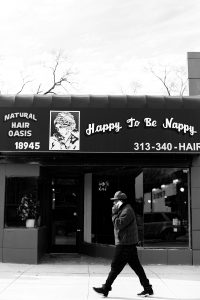
“Whenever I hire or interview people, I ask them, ‘please, just don’t forget where you come from’. That is my number one rule during an interview. When you start with me, you might be homeless, fresh outta jail, or you just need a place to have a job, because you’re on a work release. And I trust you, and I give you a whole career. You can start with me and instantly make $30-50,000 without a college degree. And I just say: ‘don’t forget where you come from”. I did go to Whitney M. Young University, which is a magnet high school, like Renaissance, that was in Chicago. Then I attended Columbia University for Journalism. And I started to see that entrepreneurship is a passion, and I could tell as a pisces woman that I’ve always been passionate.
“Everybody has a gift; a photographer has a gift, an actress has a gift, but it’s what you do with your gift.”
When young people come in here and around me, I let them know you can make the same money as a doctor if you apply yourself. Everybody has a gift; a photographer has a gift, an actress has a gift, but it’s what you do with your gift. I remember many nights staying up, working towards this dream of building Happy to be Nappy. I would be that person in New York at a bar in Times Square, working at a bar with a laptop, creating something, a film, anything. I did a film short called ‘Cracked Open’. It’s about hidden mental disorders in the hood that go undetected. And you know it’s a stigma in the community of having a mental disorder but now it’s better with social media. Growing up […] there was a stigma about schizophrenia, bipolar disorder and depression. So, I wrote a short story about a celebrity woman with family members going through stuff, and even her hidden [issues]. I would always write short stories in my free time while running the business, and [I] always thought about what to do in my retirement years, when I am no longer do[ing] hair. What are my retirement years like — it is to tell the stories through art. Hair is an art; all of this is an art. Be that person that can tell someone’s story that is meaningful that will change someone’s life.
“When I started the shop, my daughter, for instance, she is now 30, and owns a dreadlock shop called Game on Locks. When I first started this salon, [she] and I, we were like the bad boys, like the Pistons. I was the mom, I had my daughter, her best friend, and another young lady that was my niece and another young lady; we were like the Pistons, the bad boys, the crew! I would say about fifteen years ago, we had one of the badest dreadlock teams in the city. And those ladies [worked] overtime because of the beauty of them and because the popularity of the dreadlock […] at the 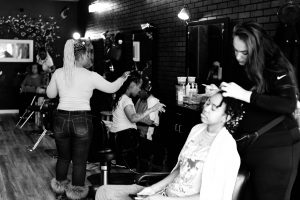 time. It was new, so there was a lot of competition. And there were people who came through and put their ego’s through the team and things like that. So for me, I am proud of all four of them. All four of the young ladies have gone on to open up their own salons, and I know for them they wouldn’t have gone and done that if it wasn’t for me. I will give knowledge to them, like this one lady, Destiny, she runs Eccentric Styles by Destiny. This young girl who could braid was hanging up under me at 16 years old. I would tell her she can braid, and she would be all ‘whatever, whatever.” She never saw herself as just a braider, she wanted to become a business owner. And my daughter, she has been down here with me since she was 11. She took on the same routine as me, never worked for anybody in her life. Then a young lady named Melinda, she has a shop. I remember her well as she came to me in my later years, and she was upfront – said, listen ‘I want my own shop like this, I want to work for you for a few years and I admire you, but I am going to get my own shop”. I admire that. I respect that. When I look back and see that, there are women out there that saw my vision and created mini Happy to be Nappy’s and then their own thing that to me lets me know I’ve done my part.
time. It was new, so there was a lot of competition. And there were people who came through and put their ego’s through the team and things like that. So for me, I am proud of all four of them. All four of the young ladies have gone on to open up their own salons, and I know for them they wouldn’t have gone and done that if it wasn’t for me. I will give knowledge to them, like this one lady, Destiny, she runs Eccentric Styles by Destiny. This young girl who could braid was hanging up under me at 16 years old. I would tell her she can braid, and she would be all ‘whatever, whatever.” She never saw herself as just a braider, she wanted to become a business owner. And my daughter, she has been down here with me since she was 11. She took on the same routine as me, never worked for anybody in her life. Then a young lady named Melinda, she has a shop. I remember her well as she came to me in my later years, and she was upfront – said, listen ‘I want my own shop like this, I want to work for you for a few years and I admire you, but I am going to get my own shop”. I admire that. I respect that. When I look back and see that, there are women out there that saw my vision and created mini Happy to be Nappy’s and then their own thing that to me lets me know I’ve done my part.
“I would love to show you some before and after of Happy to be Nappy. I was in Essence magazine about women that went from nothing to something, but I didn’t make the cut, I mean I was in it, but they chose this woman that had a million dollar shop, while mine was, like a booming shop. And the magazine asked her, how did she start her shop? And her answer was that every person needs a white friend or a rich friend. I started my shop with a welfare check. So, when I opened Happy to be Nappy, the walls, the floors, the art — I did everything with my bare hands. My friends and I did it with no loans. I’ve never had a loan in my life. We didn’t have loans, we didn’t have funding. We weren’t those people. And we survived twenty years looking good and looking like that cultural hippie store. ProsperUS gave us the funding and opportunity to create this beautiful environment for the community as it looks right now. The customers are happy, but we’re not done yet. we gutted this place out from top to bottom. I know how to [maximize] money, because I’ve done a lot of everything without nothing. So I took what they had and created everything, from the floors to the chandeliers to our new waiting area to lots of things. The future for Happy to be Nappy is here;, we want to open up a training center downstairs, to work on training more people and to bring back our eco friendly gift shop. we want to create a miniature version of Borders and Whole Foods on the Avenue of Fashion, so people can come in and pick up natural soaps, books, candles–basically like a self-healing center. This will be a mini hub or franchise, as I feel we can do this in any community. Where you can get your hair done, grab a book, a good t-shirt with a positive saying. Teach you how to meditate, all that good stuff.”

